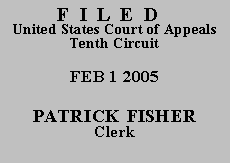

| UNITED STATES OF AMERICA,
Plaintiff-Appellee,
v.
RAFER HARRISON Defendant-Appellant. |
No. 04-2095
(D.C. Nos. CIV-03-1435 LH/KBM and CR-00-1152-LH) |
To be entitled to COA, Mr. Harrison must make "a substantial showing of the denial of a constitutional right." 28 U.S.C. § 2253(c)(2). To make the requisite showing, Mr. Harrison must demonstrate "that reasonable jurists could debate whether (or, for that matter, agree that) the petition should have been resolved in a different manner or that the issues presented were adequate to deserve encouragement to proceed further." Miller-El v. Cockrell, 537 U.S. 322, 336 (2003) (quotations omitted). In deciding whether Mr. Harrison has carried his burden, this court undertakes "a preliminary, though not definitive, consideration of the [legal] framework" applicable to each of his claims. Id. at 338. Although Mr. Harrison need not demonstrate that his appeal will succeed to be entitled to COA, he must "prove something more than the absence of frivolity or the existence of mere good faith." Id. (quotations omitted).
A jury convicted Mr. Harrison of one count of aggravated sexual abuse of a child under twelve years old in violation of 18 U.S.C. §§ 2241(c) and 2256(2)(A), and one count of abusive sexual contact with a child in violation of 18 U.S.C. §§ 2244(a)(1), (c) and 2246(3). Mr. Harrison was sentenced to 324 months imprisonment and this court affirmed his conviction on direct appeal. See United States v. Harrison, 296 F.3d 994 (10th Cir. 2002). The Supreme Court denied his petition for writ of certiorari, Harrison v. United States, 537 U.S. 1134 (2003), and Mr. Harrison timely filed for habeas relief. The district court adopted the recommendations of a magistrate judge and dismissed Mr. Harrison's petition. This appeal followed.
In his application for a COA, Mr. Harrison first complains that the jury selection process was unconstitutional because only one Native American was included in the forty-member venire. This claim could have been raised on direct appeal. "Section 2255 motions are not available to test the legality of matters which should have been raised on direct appeal." United States v. Warner, 23 F.3d 287, 291 (10th Cir. 1994). Mr. Harrison is barred from raising this issue now "unless he can show cause excusing his procedural default and actual prejudice resulting from the errors of which he complains, or can show that a fundamental miscarriage of justice will occur if his claim is not addressed." Id. at 291. Mr. Harrison has not proffered any reason for his failure to raise his venire challenge on direct appeal. He has alleged neither good cause nor actual prejudice. This claim is therefore procedurally barred and the district court properly denied relief.
Mr. Harrison next claims that his trial attorney was constitutionally ineffective for failure to offer into evidence certain medical documents. In order to prevail on an ineffective assistance claim, a petitioner must demonstrate both that his attorney's performance was deficient and that the deficiencies prejudiced his defense. Strickland v. Washington, 466 U.S 668, 687 (1984). A showing of prejudice requires a demonstration of "a reasonable probability that, but for counsel's unprofessional errors, the result of the proceeding would have been different." Id. at 694.
Mr. Harrison submits that trial counsel's failure to put into evidence the report of Dr. Caitlin Hall's medical examination of the alleged victim constituted ineffective assistance of counsel. He asserts the report was critical to his defense because it provided medical proof that refuted the alleged victim's claim of penetration. Although defense counsel did not introduce the medical report at trial, Dr. Caitlin did testify. Mr. Harrison does not refute the government's assertion that the substance of the medical report - that there was no physical evidence the victim had been abused - was a significant part of Dr. Caitlin's testimony, which was subjected to cross-examination. In other words, the substance of the medical report was admitted into evidence. Because the jury was aware through Dr. Caitlin's testimony that the sexual abuse physical examination had come back with normal results, Mr. Harrison's allegations are insufficient to meet the prejudice prong of Strickland. See Hall v. Bellmon, 935 F.2d 1106, 1110 (10th Cir. 1991) (holding that even pro se plaintiffs must allege sufficient facts on which a recognized legal claim can be based, and that conclusory allegations will not suffice). Mr. Harrison's claim simply fails to establish a reasonable probability that admission of the actual medical report would have resulted in a different outcome at trial.
For the foregoing reasons, we DENY Mr. Harrison's application for a COA and DISMISS the appeal.
SUBMITTED FOR THE COURT
Stephanie K. Seymour
Circuit Judge